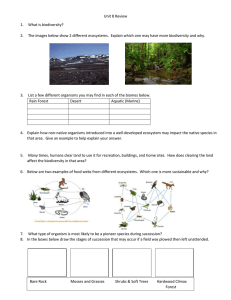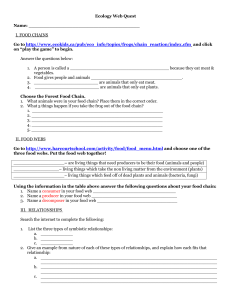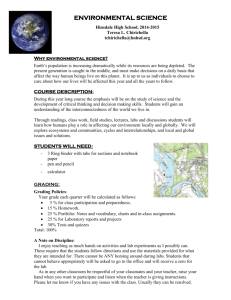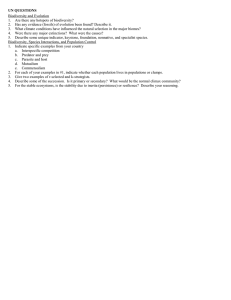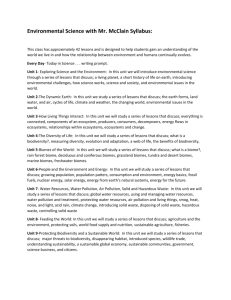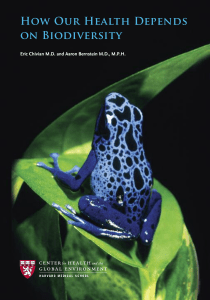Sustainability Principles: Solar, Recycling, Biodiversity
advertisement
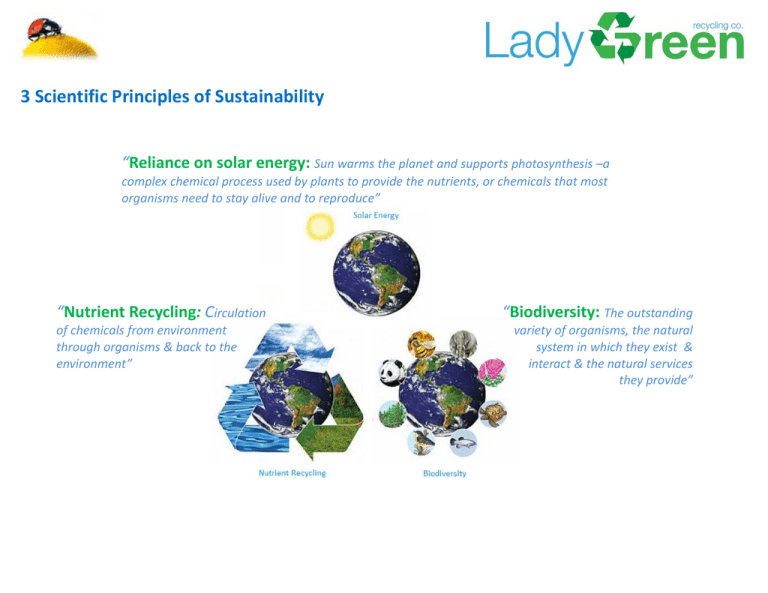
3 Scientific Principles of Sustainability “Reliance on solar energy: Sun warms the planet and supports photosynthesis –a complex chemical process used by plants to provide the nutrients, or chemicals that most organisms need to stay alive and to reproduce” “Nutrient Recycling: Circulation of chemicals from environment through organisms & back to the environment” “Biodiversity: The outstanding variety of organisms, the natural system in which they exist & interact & the natural services they provide” I. Solar Energy A. Thermal Energy Transfers 1. Solar Capital 2. Law of Conservation of Matter a. Changes of Matter 3. First Law of Thermodynamics a. Energy Transformations 4. Second Law of Thermodynamics a. Energy Efficiency b. Energy Conservation B. Energy Resources 1. Renewable Energy Sources a. Advantages b. Disadvantages 2. Nonrenewable Energy Sources a. Advantages b. Disadvantages 3. Maps and Locations of Energy Resources a. Renewable b. Nonrenewable II. Nutrient & Chemical Cycling A. Matter Cycles 1. Composition of Biogeochemical Cycles a. Water Cycle b. Carbon Cycle c. Nitrogen Cycle b. Phosphorous Cycle e. Sulfur Cycle 2. Natural Green House Effect a. Global Warming 1) Pollutant families 2) Albedo Effect 3. Solid and Hazardous Waste Case Study – E‐Waste –An Exploding Problem a. Municipal and Industrial Waste b. Waste Management c. Recycling Biodegradable Waste d. Refusing, Reducing, Reusing, Recycling III. Biodiversity Case Study – A Disturbing Message from the Birds A. Origins of Biodiversity 1. Different Types of Diversity a. Species Diversity b. Ecosystem diversity c. Functional diversity d. Genetic Diversity 2. Biosphere and Geological Processes a. Biomes regions b. Aquatic Life Zones 3. Ecosystems a. Ecological Niches 1) Natural Selection and Animal Adaptations b. Producers, Consumers, and Decomposers 4. Water and Water Pollution Case Study – Water conflicts in the Middle East: A Preview of the Future? a. Freshwater: Groundwater & Surface Water b. Water Pollution and Depletion c. Using Water More Sustainably B. Climate and Biodiversity 1. Climate a. Biomes b. Effects of Climate on Biomes c. Convection of Air and Water 2. Climate vs. Weather C. Natural Capital 1. Terrestrial Ecosystems 2. Marine Ecosystems D. Environmental Hazards and Human Health 1. Biological 2. Chemical 3. Physical 4. Cultural 5. Lifestyle E. Human Population and Urbanization Case Studies – Individuals Matter 1. Exponential Growth 2. Coevolution 3. Sustainable Urbanization and Development * A Girl’s Story about her Dream that humans will one day happily coexist with other species Environmental Science "In the end we will conserve only what we love. We will love only what we understand. We will understand only what we are taught". ‐Baba Dioum
